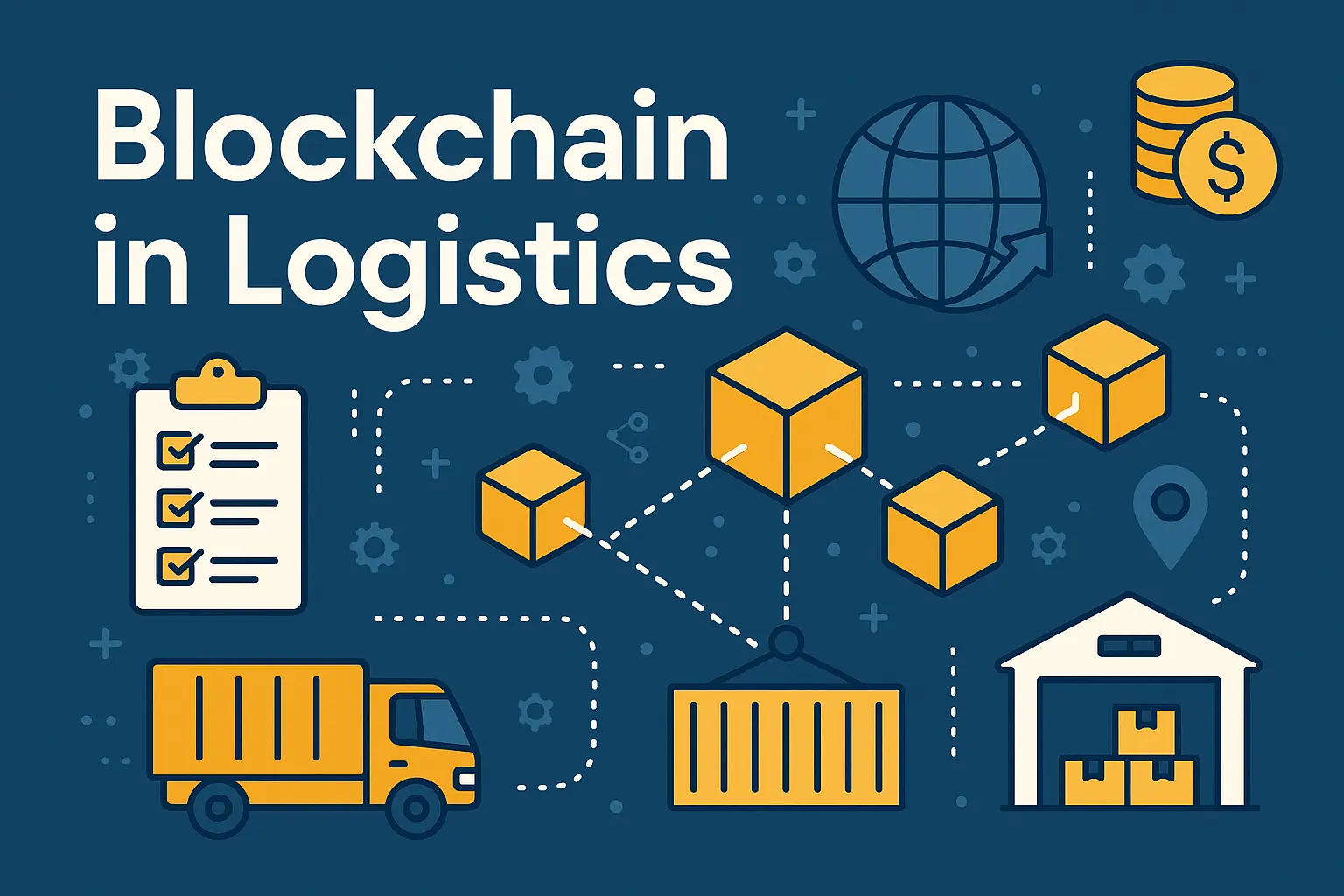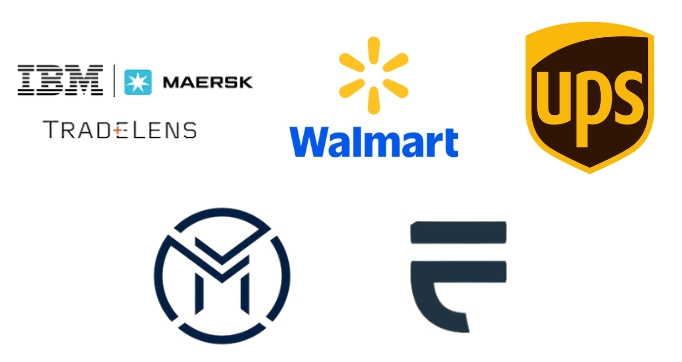Table of Contents
Blockchain in logistics enables real-time shipment tracking, secure data sharing, and automated processes across the supply chain. By eliminating data silos and manual paperwork, it improves transparency, reduces delays, and builds trust among all logistics stakeholders.
The logistics industry, a backbone of global trade, has long faced issues such as shipment delays, paperwork inefficiencies, data silos, and a lack of real-time visibility.
As supply chains grow increasingly complex, these challenges can lead to significant losses and broken trust between stakeholders. Enter blockchain, a decentralized technology that offers unprecedented transparency, traceability, and trust across every link of the supply chain.
From verifying product origin on the factory floor to tracking packages in the final mile of delivery, blockchain is reshaping logistics for the better.
This blog explores how blockchain is driving this transformation, its key benefits, real-world applications, and what the future holds for supply chain operations.
What is Blockchain in Logistics?
Blockchain in logistics refers to the use of decentralized, tamper-proof digital ledgers to manage and record every transaction, shipment, and process across the supply chain. It provides a single, shared source of truth accessible to all stakeholders, manufacturers, suppliers, shippers, customs, and retailers.
By using blockchain, companies can achieve real-time visibility, traceability, and trust in their logistics operations. Every movement of goods, from production to final delivery, is recorded immutably, reducing fraud, data manipulation, and manual errors.
Smart contracts automate tasks like customs clearance, payments, and inventory updates based on predefined conditions, streamlining operations and reducing delays. Blockchain also enhances security, supports compliance, and enables quick resolution of disputes with verified data.
From tracking high-value assets to ensuring food and pharmaceutical safety, blockchain is transforming logistics into a more transparent, efficient, and reliable ecosystem, aligning with modern demands for sustainability, traceability, and digital innovation.
Transforming the Supply Chain with Blockchain Technology
Blockchain acts as a decentralized digital ledger, recording transactions immutably and transparently. In logistics, this creates a shared, single version of truth among manufacturers, suppliers, freight carriers, customs officials, and retailers. Here’s how blockchain is redefining core supply chain processes.
Inventory & Warehouse Management
Blockchain enables real-time tracking of inventory levels across multiple locations with verified updates. Smart contracts can automatically reorder stock when levels fall below a threshold, reducing the risk of overstocking or understocking. Immutable records also help with loss prevention, fraud detection, and compliance audits.
Procurement & Supplier Verification
By maintaining a transparent record of all vendor transactions, companies can verify supplier credibility, production standards, and regulatory compliance. Blockchain also supports ethical sourcing by validating labor practices, environmental standards, and material origin, critical for industries like fashion, electronics, and food.
Shipping, Freight & Customs
Logistics involves a complex handoff of goods across ports, borders, and transport companies. Blockchain streamlines this process by allowing every stakeholder to access the same shipment data. Smart contracts can trigger automatic customs clearance, port payments, and freight handovers, reducing paperwork, delays, and errors.
Product Traceability & Recall Management
In sectors like pharmaceuticals and food, blockchain provides an end-to-end trail of a product’s journey. This enhances safety, reduces counterfeit risks, and allows rapid, targeted recalls. Consumers can scan a QR code to verify product origin, production date, and handling conditions.
Key Benefits of Blockchain in Logistics
The logistics industry is built on movement and trust, both of which blockchain enhances in multiple ways. However, these benefits can be availed only if you hire the top blockchain solution provider. Below are the most compelling advantages of adopting blockchain in logistics.
Enhanced Transparency and Visibility
Blockchain provides real-time access to shared data across the supply chain. Each transaction or shipment update is time-stamped and immutable, allowing every party to track goods from origin to destination without relying on manual updates or siloed systems.
Reduced Fraud and Counterfeiting
By securely recording every transaction, blockchain makes it nearly impossible to manipulate shipping records or misrepresent product origin. This is especially valuable in high-risk sectors like luxury goods, electronics, and pharmaceuticals, where counterfeit activity is rampant.
Automated Operations via Smart Contracts
Smart contracts automatically execute agreed-upon actions, like releasing payment upon delivery confirmation without human intervention. This reduces processing delays, minimizes disputes, and enhances trust among trading partners.
Faster Dispute Resolution
Disputes often arise due to miscommunication or a lack of real-time information. Blockchain’s shared, tamper-proof records provide instant clarity and proof for all stakeholders, accelerating issue resolution and maintaining business continuity.
Lower Operational Costs
Blockchain reduces the need for intermediaries, redundant paperwork, and third-party verification services. This results in lower administrative costs, faster settlements, and improved efficiency across procurement, shipping, and customs workflows.
Real-World Use Cases: Blockchain in Action Across Logistics
Blockchain is no longer a concept; numerous global players have launched successful blockchain pilots and platforms to solve pressing logistics challenges. Below are the top 5 platforms in the market that have incorporated blockchain in logistics.
IBM & Maersk – TradeLens
IBM and Maersk co-developed TradeLens, a blockchain-based platform for global shipping. It connects shippers, ports, customs, and carriers to a single shared ledger, reducing paperwork, streamlining customs clearance, and enhancing visibility in maritime logistics.
Walmart – Food Safety and Traceability
Walmart uses blockchain to track food products from farm to shelf in seconds. This has drastically improved food safety, minimized spoilage, and reduced the time required to trace contaminated products during recalls.
UPS & Blockchain in Freight Management
UPS has explored blockchain for automating freight contract management and improving transparency in last-mile delivery. By integrating blockchain with IoT data, the company gains real-time insights into shipment location, condition, and delivery status.
MediLedger – Pharmaceutical Supply Chain
In response to growing counterfeit drug threats, MediLedger offers a blockchain network that verifies prescription drug transactions across manufacturers, wholesalers, and pharmacies, in compliance with the U.S. Drug Supply Chain Security Act (DSCSA).
Everledger – Asset Tracking for Luxury Goods
Everledger uses blockchain to trace the journey of diamonds, fine wines, and luxury watches. It ensures product authenticity, builds consumer trust, and combats grey-market trading using tamper-proof digital records.
The Road Ahead: Future of Blockchain in Logistics
Blockchain is poised to become a foundational pillar of logistics infrastructure, especially when combined with emerging technologies like AI, IoT, and digital twins. Here’s a glimpse of what the future may look like:
Blockchain + IoT for Autonomous Logistics
By integrating blockchain with IoT sensors, companies can record real-time environmental data such as temperature, humidity, or shock impact. This ensures greater transparency in sensitive shipments like vaccines, electronics, and perishable goods, automatically triggering alerts or claim processes if mishandling occurs.
Digital Identities and Compliance Automation
Blockchain can store digital identities of drivers, fleets, and freight containers. This speeds up cross-border shipments by automating identity checks, license verifications, and compliance with international transport regulations.
Tokenization of Freight and Assets
Digital tokens representing cargo or shipping containers can be traded on blockchain marketplaces. This can improve liquidity in freight contracts and help logistics companies raise capital by monetizing underutilized capacity or future shipments.
Green Logistics and Sustainability Tracking
As ESG becomes a global priority, blockchain can track and verify carbon emissions, ethical sourcing, and sustainability metrics. It can create an auditable trail proving a company’s commitment to green logistics practices, which is crucial for regulatory and investor confidence.
Standardization and Industry-Wide Adoption
Organizations like the Blockchain in Transport Alliance (BiTA) are working on creating standards for blockchain interoperability. As these standards mature, blockchain’s adoption will scale across carriers, ports, customs agencies, and third-party logistics (3PL) providers.
Conclusion
Blockchain is ushering in a new era of transparency, efficiency, and trust in the logistics industry. From real-time tracking and automated payments to counterfeit prevention and recall readiness, its impact spans the entire supply chain from the factory floor to the final mile.
As more companies embrace blockchain, integrated with AI, IoT, and predictive analytics, we can expect a more agile, data-driven logistics landscape.
Though challenges like interoperability, scalability, and regulatory clarity still exist, the momentum is undeniable. Businesses that invest early in blockchain solutions will not only optimize their operations but also future-proof their supply chains for a hyper-connected global economy by incorporating blockchain in logistics.
If you are looking for a blockchain development company to incorporate this trending technology in your logistics app, hire Technoloader. We are a leading name in the market offering blockchain solutions as per our clients’ needs and requirements.
So, what’s waiting for? Connect with our experts now and believe the unbelievable.
 +91 7014607737
+91 7014607737
 info@technoloader.com
info@technoloader.com




